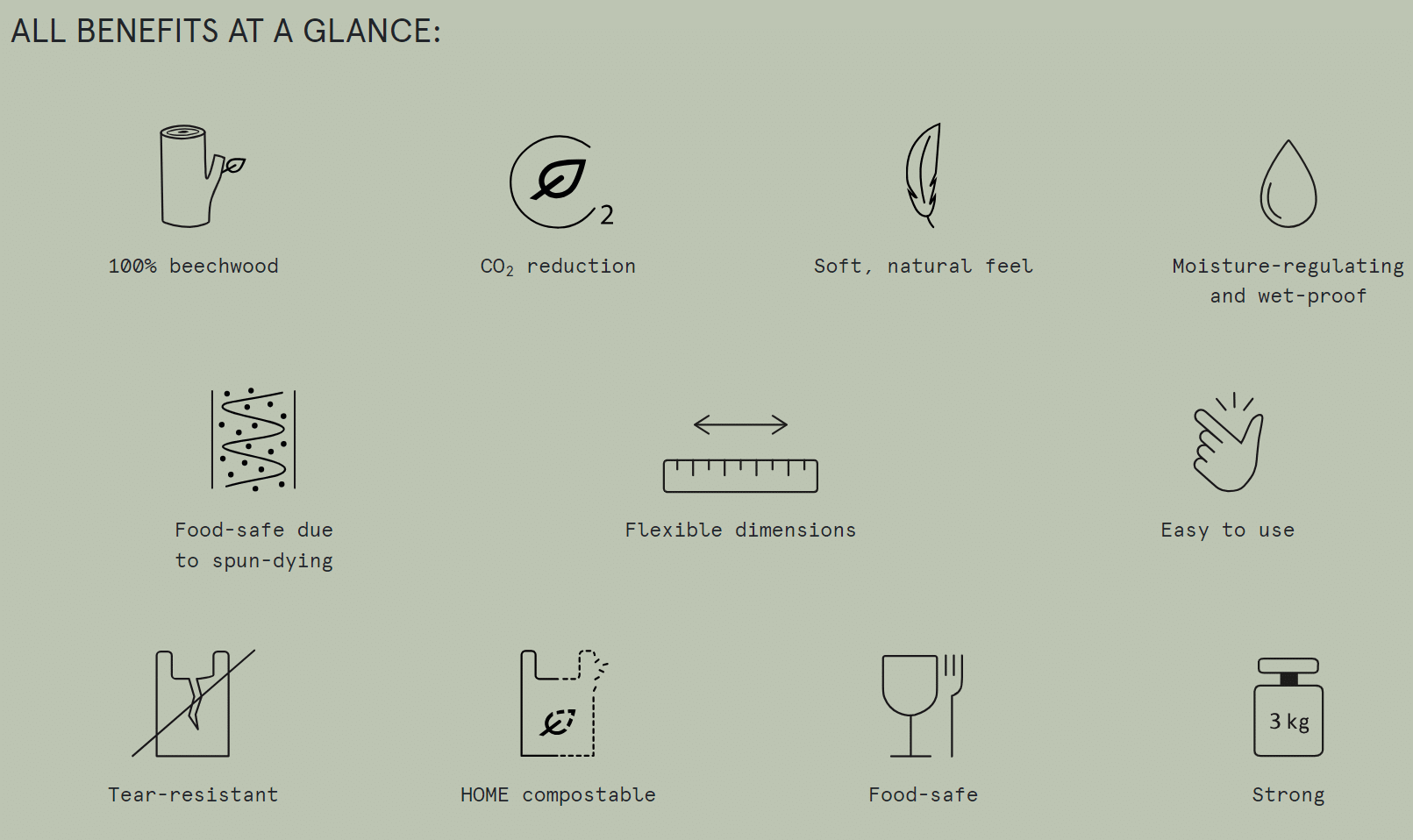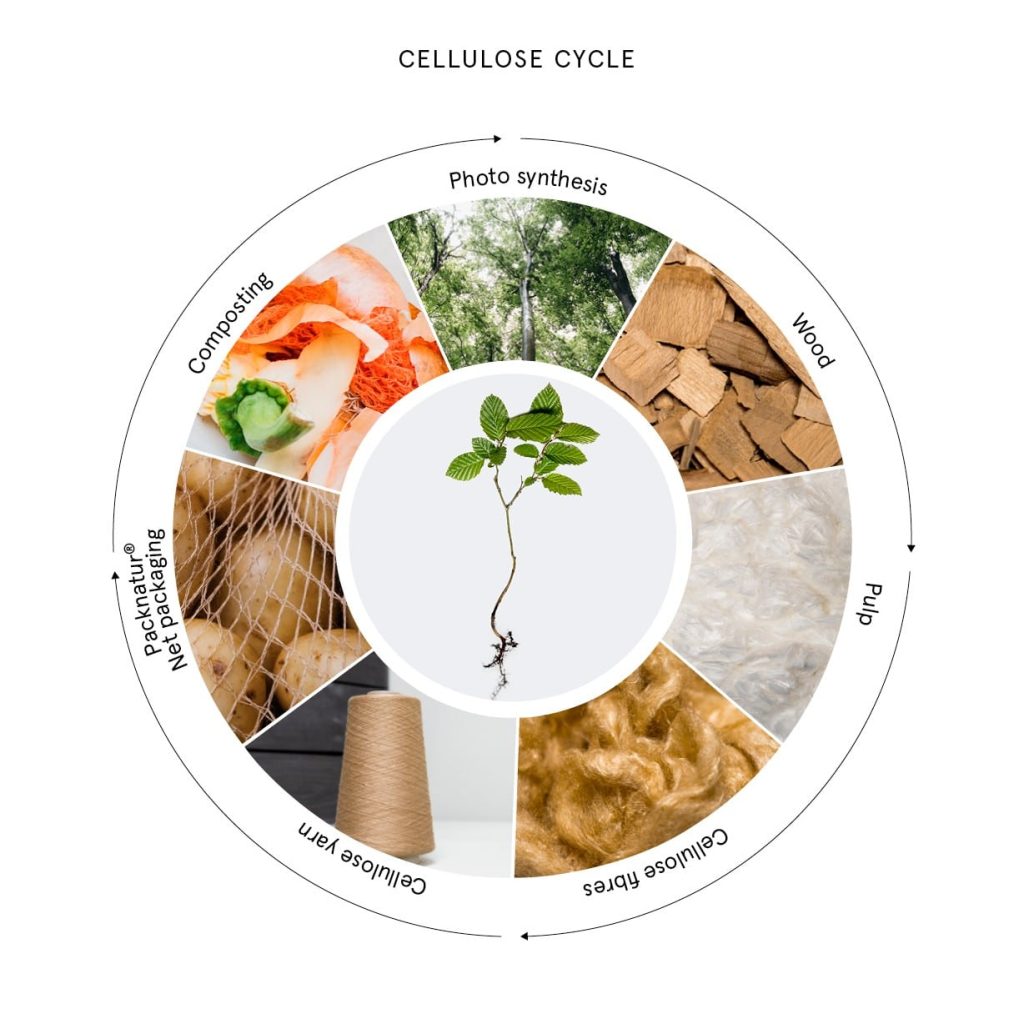



Welcome to the latest innovative solution for sustainable netting bags for fruit and vegetables – Cellulose Tube Netting. This biodegradable, compostable, and eco-friendly netting is the perfect choice for packaging fruit and vegetables.
Made from LENZING™ Modal beechwood cellulose, our netting bags for fruit and vegetables offer an environmentally responsible alternative to traditional plastic packaging.
As a leader in the market, Packnatur® is committed to delivering high-quality, sustainable packaging solutions that not only meet the demands of the market but also help reduce plastic waste and support a greener future.
The Packnatur® Cellulose Tube Netting by VPZ is biodegradable and certified with the “OK compost HOME” label for Europe and the USA.
This packaging innovation from VPZ is one of the highest awarded sustainable packaging solutions globally.
Natural Material: Packnatur® Cellulose Tube Netting is made from 100% LENZING™ Modal beechwood cellulose, a renewable resource that significantly reduces reliance on fossil fuels and eliminates plastic waste.
Durable and Soft: Despite being biodegradable, this fruit and vegetable netting is durable enough to protect produce during transportation and storage, while also being soft to the touch, enhancing the consumer experience.
Compostable and Biodegradable: Packnatur® Cellulose Tube Netting is fully compostable and biodegradable, certified with the “OK compost HOME” label for Europe and the USA. This ensures that the netting can safely return to the environment without leaving harmful residues.
Spun-Dyed Technology: The use of spun-dyed fibres mean an environmentally superior composition to conventional dyeing processes, using 64% less water, 90% fewer chemicals, 20% less energy, and producing 64% less waste water. The pigments are fully integrated into the fibres, making them safe for food use.
Naturpac* is the exclusive distributor of PACKNATUR® sustainable netting bags for fruit and vegetables packaging products in Australia and New Zealand.
Material Composition: 100% LENZING™ Modal beechwood cellulose.
Standard Dimensions:
| FILLING TUBE | WIDTH OF MESH (STRETCHED) | UNIT | DELIVERY UNIT |
| Ø 250 mm | 54 mm | 200 lfm (Manschette) | 15 Man = 3.000lfm |
| Ø 200 mm | 50 mm | 200 lfm (Manschette) | 15 Man = 3.000lfm |
| Ø 165 mm | 38 mm | 100 lfm (Manschette) | 40 Man = 4.000lfm |
| Ø 90 mm | 22 mm | 100 lfm (Manschette) | 60 Man = 6.000lfm |
Breathable and Freshness Preserving: The natural breathability of these netting bags for fruit and vegetables helps keep produce fresher for 2 to 3 days longer. This feature is particularly beneficial for products like apples, avocados, capsicum, kiwifruit, lemons, limes, mandarins, and potatoes.
Ecofriendly: Packnatur® netting bags for fruit and vegetables are made from natural, renewable resources, significantly reducing the environmental impact compared to plastic packaging.
Consumer Appeal: With increasing consumer awareness of environmental issues, sustainable packaging solutions like Packnatur’s cellulose netting attract environmentally conscious consumers.
Cost Effective: These netting bags for fruit and vegetables are competitively priced, making the transition from plastic or alternatives to sustainable packaging affordable for growers, producers, packhouses and retailers.
Compliance: Packnatur® Cellulose Tube Netting meets Australian sustainability regulations, supporting national efforts to reduce plastic waste. According to the Australian Packaging Covenant Organisation (APCO), initiatives like ours contribute to the goal of having 100% of packaging reusable, recyclable, or compostable by 2025.
Made in Austria. Used all over the world.
Packnatur® factory in Neudau (Austria) was opened in 2019. Packnatur® complies with the strictest quality standards when it comes to organic and raw materials, technologies, manufacturing processes, hygiene practices and working conditions.

A truly revolutional packaging innovation changing the landscape of sustainable netting bags for fruit and vegetables.
100% BIO-BASED
100% BIODEGRADABLE
100% COMPOSTABLE
0% WASTAGE
0% TECHNICAL PROBLEMS
0% PLASTIC WASTE
Beechwood forests are naturally occurring primary forests and are able to regenerate themselves, without the need for reforesting. The recycling economy plays a key role in the Packnatur® philosophy. Every product needs to be able to be returned to the natural cycle, so that resources are saved for future generations.
Packnatur® netting products are made from spun-dyed fibres. In other words, the colour pigment is injected straight into the fibre instead of using the conventional textile dying process. In comparison to traditional dying, which takes place once fibres have been spun, spun-dyed fibres need
64% LESS WATER
90% FEWER CHEMICALS
20% LESS ENERGY
62% LESS HEAT
64% LESS WASTE WATER

Cellulose fibers biodegrade within 12 weeks and are also suitable for home composting.
They are completely free from residues and petrochemicals. It goes without saying that they don’t contain any microplastics either, and if they do happen to land in the sea, they simply decompose. A solution that we – and the environment – can feel good about.

Truly versatile and can be used across various sectors of the fresh produce industry. Here are some examples of their applications:
Apples and Avocados: The netting bags for fruit and vegetables are perfect for packaging apples and avocados, providing protection and breathability to keep them fresh for longer.
Capsicum and Kiwifruit: Medium-sized netting is ideal for packaging capsicum and kiwifruit, ensuring they are well-protected and maintain their freshness.
Lemons and Limes: Our netting is excellent for packaging citrus fruits like lemons and limes, offering durability and breathability.
Mandarins: Larger netting bags are suitable for packaging bulkier produce such as mandarins preventing premature spoilage.
Potatoes: Netting bags are suitable for packaging bulkier produce such as potatoes preventing premature sprouting and spoilage.
Onions: The breathable netting is particularly beneficial for packaging onions, reducing moisture accumulation and extending shelf life.
*Naturpac is a subsidiary of J-Tech Systems Pty Ltd, which is a subsidiary of the Jenkins Group
Naturpac sets the standard for change in ethical packaging. We are all on a journey towards packaging for a better earth.